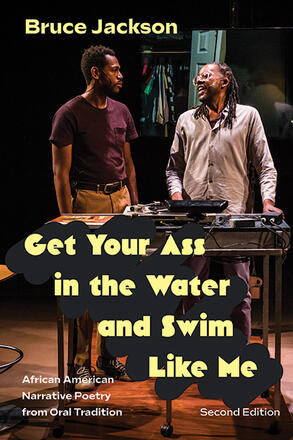
Get Your Ass in the Water and Swim Like Me, Second Edition
African American Narrative Poetry from Oral Tradition
Alternative formats available from:
The classic work on African American toasts, the predecessor of rap.
Description
Get Your Ass in the Water and Swim Like Me celebrates the African American oral tradition of toasting, one of the key roots of contemporary rap. Jackson was among the few to appreciate the profane energy and beauty of this rhymed form, collecting such classic toasts as "Stackolee," "The Titanic," "Signifying Monkey," "Dance of the Freaks," and dozens more. This unexpurgated edition offers the raw, vibrant, and still startling imagery of these toasts shaped by decades of oral transmission through the voices of countless rhymers. Just like rap, the toasting tradition enabled previously unheard or stifled topics, including racism, sexual exploitation, economic deprivation, and social oppression, to be expressed in a form that embodied multiple layers of meaning. Jackson helped preserve a rapidly dying art form to ensure that it would be available for many generations to come. In the words of Robin D.G. Kelley, "All you Hip Hop heads need to know this book if you want to know your roots."
Bruce Jackson is SUNY Distinguished Professor and the James Agee Professor of American Culture at the University at Buffalo, State University of New York. His numerous books include The Story is True: The Art and Meaning of Telling Stories, Second Edition, Revised and Expanded; Ways of the Hand: A Photographer's Memoir; and Voices from Death Row (with Diane Christian), all published by SUNY Press. He lives in Buffalo, New York.
Reviews
Praise for the Original Edition
"A brilliant, groundbreaking work in both the collection and analysis of African American oral culture. Indispensable." — Henry Louis Gates, Jr., Harvard University
"A stone cold classic!" — Robin D.G.Kelley, author of Freedom Dreams: The Black Radical Imagination
"Funny as all get out, full of biting wit and dazzling wordplay, this book drops more science than Einstein while proving the genius of black folk who created meaning and defended their lives through signifying words." — Michael Eric Dyson, author of Mercy, Mercy Me: The Art, Loves & Demons of Marvin Gaye
"These poems are the source of rap." — Amiri Baraka, author of Blues People